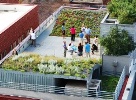NRG Energy Inc. is launching the nation’s first privately funded, comprehensive electric vehicle infrastructure in Houston, the start of a rollout across Texas, in 2011.
Amid concerns of dangerously elevated lead levels in the reusable grocery bags many earth-conscious consumers have been using for several years, the Earthwise Bag Company Inc. and the Green Bag Company Inc. announced that regular, independent testing has confirmed their reusable grocery bags have consistently met federal standards.
A Sodexo pilot program at eight college campuses has cut kitchen waste by about one-third by tracking and monitoring food waste, lowering both costs and unnecessary methane emissions from decomposing food.
SolarReserve LLC announced a joint venture with GCL Solar Energy Inc. to develop, build and operate solar photovoltaic facilities in the 5 megawatt- to 20 megawatt-sized range on 40 different sites across the United States.

The Philadelphia Eagles announced a plan to power Lincoln Financial Field with a combination of onsite wind, solar and dual-fuel generated electricity, making it the world’s first major sports stadium to convert to self-generated renewable energy.

With advances in nanostructured devices, lower operating temperatures, and the use of an abundant fuel source and cheaper materials, Harvard researchers are increasingly optimistic about the commercial viability of solid-oxide fuel cells.
Emory Conference Center Hotel, Atlanta's first LEED-Silver Certified Conference Center Hotel, is redoubling its recycling efforts by finding interesting ways to recycle partially used soap and shampoo.
Approximately 13 million metric tons of rare earth elements exist within known deposits in the United States, according to the first-ever nationwide estimate of these elements by the U.S. Geological Survey.
The U.S. Green Building Council has introduced a new program designed to streamline and create capacity for the LEED building certification process. LEED Automation enables LEED Online, the online tool projects use to submit documentation and certify LEED projects, to interact with third-party technology platforms.
The global firm will seek to grow its business in developing countries while minimizing its environmental footprint.
Duke economist Martin Smith suggests the agency should also consider the potential health and environmental effects of salmon production that might stem from the fish's faster growth and less need for feed.
Pennsylvania’s Gov. Edward G. Rendell said his state is aiming to cut its oil consumption by more than a half-million gallons as it invests in 21 alternative fuel projects that will create 221 jobs and cut carbon dioxide emissions by 14.5 million pounds.

State-level leaders are building regional partnerships to accelerate work on the green economy while California recognizes the work in progress through its award program.
U.S. policymakers must focus more closely on developing new energy storage technologies as they consider a national renewable electricity standard.

Eco Expo Asia featured green transportation at its fifth annual conference and exhibition in Hong Kong.
- By L.K. Williams, EPonline

Green Roofs for Healthy Cities will present the American Society of Landscape Architects the 2010 Award of Excellence in December.
Ron Sivitz' designed beach house recently won Platinum status from the U.S. Green Building Council. The builder shares tips on how to make your project LEED-worthy.

The heat radiating off roadways has long been a factor in explaining why city temperatures are often considerably warmer than nearby suburban or rural areas. Now a team of engineering researchers from the University of Rhode Island is examining methods of harvesting that solar energy to melt ice, power streetlights, illuminate signs, heat buildings and potentially use it for many other purposes.

Rising temperatures decrease wind speeds, making for less power bang for the wind turbine buck.

Using a University of British Columbia-developed technology, Abrary and his team at Ostara Nutrient Recovery Technologies Inc., have managed to launch four full-scale facilities with two more in the design phase in just five years.